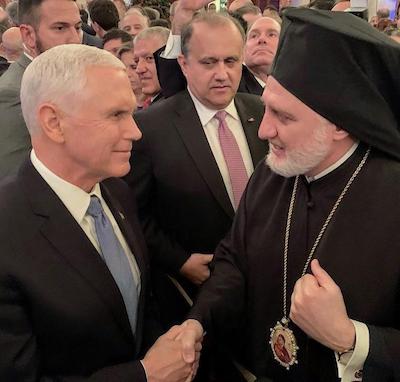PARISH NEWS AND NOTES
**ON SUNDAY**NO SUNDAY SCHOOL…Due to a large majority of our students and faculty in Orlando for the annual Hellenic Dance Festival, there will be no Sunday School today. Classes will resume next Sunday, January 26, 2020.
**NEW**HELLENIC SCHOOL…You are cordially invited to join us for the celebration of the Three Hierarchs and Greek Letters day on Sunday, February 2, 2020, in the Hellenic Center immediately following Divine Liturgy. The Guest Speaker will be Barbara Reynolds.
**NEW**WILMINGTON MUSIC FESTIVAL opens its 2020 Season next month!! The OPERA GALA will be held on Friday, February 7 at 7 PM at Beckwith Hall at UNC-W featuring Michael Rallis, tenor, Nikoleta Rallis, soprano, Aza Sydykov, piano. Tickets are $25 through the Kenan Box Office (M-F from 12 PM – 4 PM). For more information, please visit the website www.wilmingtonmusicfestival.org.
**NEW**HDF AWARDS & RECOGNITION…Join us as we celebrate participating HDF Youth Dancers & Directors on Sunday, February 9, 2020, in the church immediately following Divine Liturgy. A Fundraising Luncheon will be held in the Hellenic Center sponsored by the Youth Dance Groups. The donation will be $10 per plate and kids under 8 Free.
**NEW**FOREVER YOUNG…SAVE THE DATE…Please join the Forever Young group on Tuesday, February 11, 2020, at 11:45 at St. Nicholas Hellenic Center for Lunch and a Movie.
**NEW**VALENTINES DAY DANCE…SAVE THE DATE…for the annual St. Valentine’s Dance sponsored by the St. Nicholas Hellenic School and the local AHEPA Chapter #408 on Saturday, February 15, 2020, in the Hellenic Center. Pashalis Band will provide the music for your enjoyment and dancing. Come and enjoy good fellowship, good food, and good entertainment. This year as part of the 75th celebration of our Parish, we will recognize the couples who were married at St. Nicholas. Please provide the church office your name(s), date of service, and ONE photo from your wedding.
**NEW**LADIES PHILOPTOCHOS SOCIETY…SAVE THE DATE…The next General meeting will be on February 16, 2020, following Divine Liturgy. Guest speaker from Hospice Life Care Center. All ladies are invited to attend!
BIBLE STUDY…SAVE THE DATE…After many years, Bible Study has returned!!! Starting this Thursday, January 23 at 7 pm, we will take a 5-week look at the three letters of Saint John the Theologian. These short but powerful books of the Bible are incredibly inspiring works and help lay the groundwork for much of our Church theology. We will have Bible Study immediately following Vespers at 6:30 pm every Thursday. All are welcome to attend!
YOUTH MISSION TRIP…Planning is underway for our 2nd Annual St. Nicholas Youth Mission trip!!! If you have any interest in joining our team this summer, please attend a very important meeting this Thursday, January 23rd, at 6 pm. Adult leaders and youth (rising 9th grade through 12th grade) can participate in this very worthy service project. Contact Doris King (910-777-1535) with any questions or if you cannot attend this meeting. We are excited for another great experience with the Appalachian Service Project. We plan to serve July 5-11 in the NC Appalachian Mountains, with Father Steven as our mission team leader.








 WASHINGTON – His Eminence Archbishop Elpidophoros of America attended tonight a State Department reception in honor of the Prime Minister of Greece, His Excellency Mr. Kyriakos Mitsotakis.
WASHINGTON – His Eminence Archbishop Elpidophoros of America attended tonight a State Department reception in honor of the Prime Minister of Greece, His Excellency Mr. Kyriakos Mitsotakis.